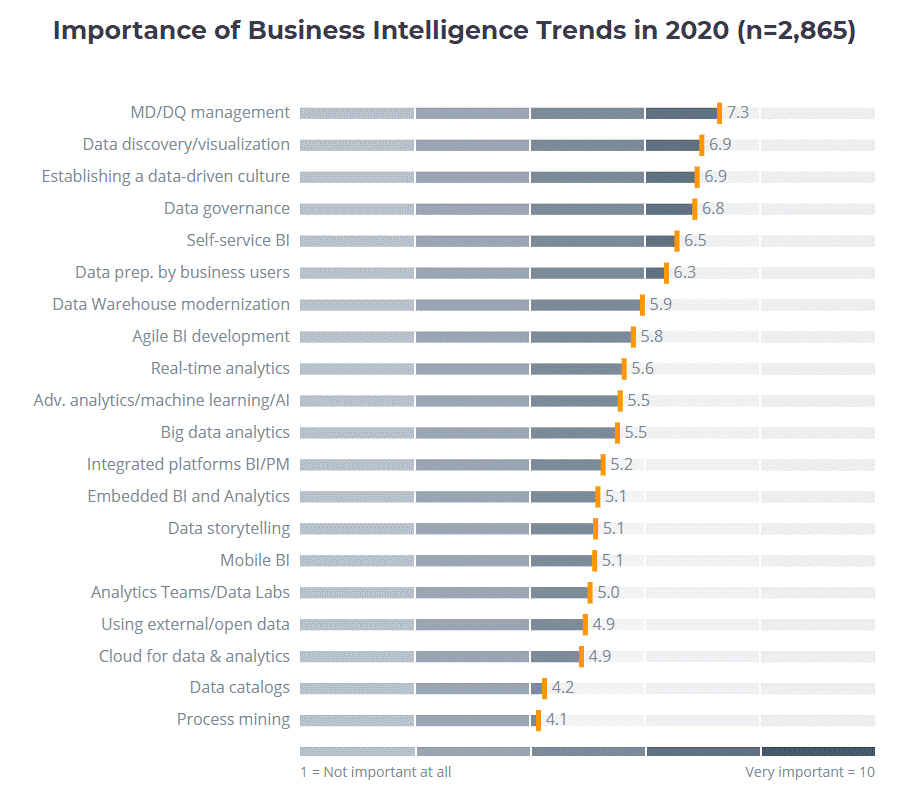Businesses today realise the power of data and are altering their processes to become a data-driven company. Global beverage leader, Coca Cola witnessed savings of over 260 hours a year – that is more than six 40 hour weeks – when they moved from their manual reporting processes to an automated Business Intelligence platform. So, data analytics is a business asset and is here to stay.
That being said, 2023 will see the emergence of new trends that will take BI beyond data analyses and make it more about data quality management, data discovery/ visualization, artificial intelligence and data-driven culture amongst others. The Business Application Research Centre conducted a survey over nearly 2,900 BI experts for their views on the most important BI trends and this is what they found:

Here is Embee’s take on the BI trends that will take center stage in 2023:
1. Augmented Analytics will make Business Intelligence more accessible:
Augmented Analytics is one of the top data analytics trends to watch out for in 2023. With data analytics inherently linked to business intelligence, we can expect growth in augmented analytics to have an impact on BI platforms.
2. New avenues for data discovery easier:
Unlike previous years data today is collected from multiple sources. And as more people access and interact on the internet, it becomes possible to analyze and catalog this information in a way that AI systems can segment and use for business purposes. AI and data investor Matt Turck calls it “the datafication of everything”.
So 2023 will witness a great influx of data sources, giving organizations a stronger guide on their operations, marketing and sales decision-making.
3. Self-service BI continues to be a high priority:
2023 will find most business leaders preferring self-service BI solutions to analyze business data and customize visual reports. This trend will gain momentum as there is greater flexibility, minimum dependence on IT specialists and self reliance in reporting and analysis. Gartner research vice president, Rita Sallam, states “self-service data integration will reduce the significant time and complexity users face in preparing their data for analysis and shift much of the activity from IT to the business user.”
4. Data Quality Management cannot be undermined:
We expect organizations to invest more in data governance, specifically Data Quality Management (DQM) in 2023. Meeting strict data quality levels also helps with meeting standards of latest compliance regulations and demands. DQM includes a number of processes like advanced data processes, distributing the data effectively and managing oversight data. By implementing company-wide DQM processes, businesses leverage the power of BI and gain a competitive edge.
5. Data Visualization:
A good data visualization dashboard leads to greater adoption due to increased usability and lesser time to insight. Also, it extends the promises of a truly self-service BI tool by enhancing non-analysts’s pattern-recognition capabilities, thereby enabling better decision making at the management level. Business leaders agree that they find it easier to detect patterns if data is conveyed in charts and graphs rather than in figures.
6. Predictive is not enough, prescriptive analytics will also become more important:
Till date business intelligence tools have helped enterprises predict consumer behavior, forecasting possible scenarios based on past patterns and practices. While that is a leap from a decade ago, or even 5 years if we may say, the future is still estimated.
Prescriptive analytics probes much deeper into the future. It analyzes data and content to determine which decisions can be more beneficial for the business and which steps should be avoided to achieve an intended goal. Comprising of various techniques like graph analysis, simulation, complex event processing, neural networks, recommendation engines, heuristics, and machine learning, prescriptive analytics tries to gauge the impact of future decisions before they are actually made, ‘prescribing’ corrections, if and when necessary. In practical situations, this will not only improve decision making but also optimize scheduling, production, inventory and supply chain design to enable businesses deliver what their customers want in the best possible way.
7. Artificial Intelligence will render analytics more accurate:
Having already evolved from static, passive reports to proactive reports on live dashboards, Business Intelligence solutions are now using AI algorithms that are based on advanced neural networks and keeps on learning from past records and patterns, to achieve higher accuracy in anomaly detection. This way, businesses can be alerted of potential problems and course correction can be initiated immediately. Moreover, with such an advanced decision support system software one can choose the data set they want to analyze and calculations will be fetched along with growth, trends and forecast, key segment correlations, anomalies, value drivers as well as ‘what if’ scenarios.
As Gartner has predicted, more than 40% of data science tasks will be automated by 2023. Keeping that in mind, we think advanced algorithms, driving that automation, will be more competitive in near future, enabling machines to operate autonomously and make decisions efficiently. It is now time for businesses to decide whether semi-automated decision making should be left completely on algorithms or not.
8. Investing in Mobile BI means gaining a competitive edge:
Mobile BI is on an upward trajectory. Companies using mobile BI are almost 70% more likely to use business data at the exact moment it is needed, compared to business that don’t use it. Thus, the number of businesses using mobile BI is expected to increase noticeably year-on-year. Gartner also predicts that By 2024, the value of the mobile business intelligence market will top $20B.
Being only data driven is no longer enough. It is an expectation that modern businesses must meet. 2023 is the year to go beyond that expectation with exciting new possibilities. It is time to evaluate how data driven you are. Are you ready to take note of these trends and extract the maximum value from Business Intelligence solutions. You must!
















































